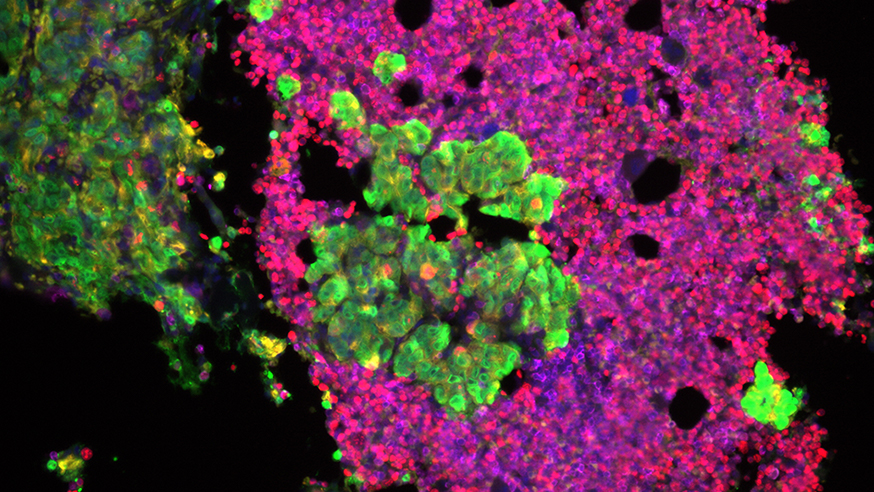
Prostate cancer cells (photo: Johann de Bono)
An early blood test could help doctors identify which patients will benefit from treatment for advanced prostate cancer, according to a new study.
Researchers found that a blood test taken just four weeks after treatment with the prostate drug abiraterone could highlight patients that are most likely to respond well to the treatment.
Prostate cancer is the most common cancer in men and it often spreads to other parts of the body, such as the bones.
Hormone therapy is used to stop the male hormone testosterone from reaching prostate cancer cells and fuelling their growth. When this treatment fails, and the cancer has spread, it is known as metastatic castration-resistant prostate cancer.
With newer treatments available for these patients, it is important to know early whether a drug is working. Failing treatments can then be switched in order to prolong life.
However, measuring treatment responses in this advanced disease is tough because imaging techniques struggle to capture the extent of the spread of this cancer.
Instead, blood tests are used to measure levels of prostate-specific antigen (PSA), which is produced by prostate cancer cells. It is currently recommended that these tests are taken 12 weeks after treatment is started. Reduced levels in the blood indicate a positive treatment response.
Data 'could change current practice'
Researchers at The Institute of Cancer Research, London, and The Royal Marsden NHS Foundation Trust studied 274 patients with metastatic castration-resistant prostate cancer. They received the prostate cancer drug abiraterone – discovered at the ICR – and levels of PSA were monitored.
The scientists found that PSA levels in the blood predicted treatment outcomes just four weeks into treatment – eight weeks earlier than current tests. If the level of PSA in a patient’s blood had declined by 30% after 4 weeks of abiraterone treatment, the studies showed that they were likely to survive for substantially longer and were more likely to respond positively to longer-term treatment.
Professor Johann de Bono, Head of the ICR’s Division of Clinical Studies, said: “Experts currently recommend the use of PSA testing no earlier than 12 weeks after treatment. Our data suggest that earlier blood tests could predict how a patient will respond to treatment and their overall chance of survival.
“Test at just four weeks showed us when treatment was likely to fail. These patients could be switched to alternative therapy more quickly to help extend their life. If confirmed by larger studies, these data could change current practice.”
The study was published in European Urology and received funding from a Prostate Cancer UK Centre of Excellence program grant, the Prostate Cancer Foundation, Cancer Research UK and the Spanish Medical Oncology Society.